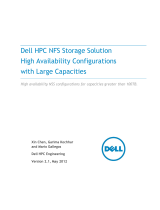Page is loading ...

Dell HPC Solution Refresh: Intel
Xeon Ivy Bridge-EP, 1866 DDR3
memory and RHEL 6.4
by Calvin Jacob and Ishan Singh
Support for Intel Xeon Ivy Bridge-EP processors, 1866 DDR3 memory and RHEL 6.4 has been added to the current
Dell HPC Solution. This solution is based on Bright Cluster Manager 6.1, with RHEL 6.4 as the base OS supported
on Ivy Bridge processors. BCM is a complete HPC solution from Dell which can automate, deploy and manage an
HPCC. Recommended BIOS settings for the supported platforms, along with BMC/iDRAC settings are scripted and
made available to the user, if he chooses them. Dell system management tools are bundled with Bright Cluster
Manager and used to set, configure and manage Dell hardware.
The highlights of this release are additional support for:
1. Intel Xeon Ivy Bridge-EP (E5-26xx v2) processors.
2. Redhat Enterprise Linux 6.4 (kernel-2.6.32-358.el6.x86_64).
3. Mellanox OFED 2.0-3.
4. CUDA 5.5.
5. PEC Tools for systems management of PE-C servers.
6. Hardware Match Check by BCM.
Ivy Bridge-EP processors
Support for Intel Xeon Ivy Bridge-EP (E5-26xx v2) processors has been added to the refreshed and existing servers:
R620, R720, M620 and C8000 series and C6220II. Intel Ivy bridge-EP processors have Tri-Gate transistors which
use 3-D (non-planar) architecture to package more transistors into less space. These processors have up to 12
cores, 30MB Last-Level Cache (LLC), DDR3 memory with speeds up to 1866 MHz, QPI speeds of 8 GT/s, up to 40
PCIe 3.0 lanes and a TDP up to 130W. The previous generation Intel Xeon Sandy Bridge processors used 32 nm

technology, whereas the new Intel Xeon Ivy Bridge-EP are a 22 nm thus delivering higher density and more
performance within the same power envelope.
Redhat Enterprise Linux 6.4 (kernel-2.6.32-358.el6.x86_64)
RHEL 6.4 (kernel 2.6.32-358.el6.x86_64) is the minimum supported Operating System for Intel Ivy Bridge-EP
processors. Some of the highlights of RHEL 6.4:
1. Updated Resource Management Capabilities.
2. New Tools and Improved Productivity Support.
3. Updated network drivers and fixes for supported Intel, Broadcom network adapters.
Mellanox OFED 2.0-3
Support for Mellanox OFED 2.0-3 has been added. MLNX OFED 2.0-3 OFED includes drivers for mlx4 devices
(ConnectX3 and ConnectX2) and mlx5 devices (ConnectIB). Devices that would be officially supported are
ConnectX3 and ConnectX2 with signaling rates of 20, 40 and 56Gbps in the Infiniband mode.
PEC Tools for systems management of PE-C servers
PEC Tools are the official tools for systems management on PowerEdge-C servers. These tools can be used for
configuring BMC and BIOS parameters. The tools are included in the BCM 6.1 under the folder /opt/dell/pec.
Examples of tool usage:
/opt/dell/pec/setupbios setting save > filename (To save the BIOS settings)
/opt/dell/pec/setupbios setting readfile filename (To read and apply settings from a saved file)
/opt/dell/pec/setupbios setting set [setting] [value] (To set value for a particular option)
Hardware Match Check by BCM
This tool is available with the Bright Cluster Manager. It is used to compare a large number of nodes that want to be
added to a cluster. BCM provides this feature to check the consistency of the hardware across nodes. This is done by
comparing the hardware profile of one of the nodes with the rest of the nodes in the same node group. The hardware

match check can be automated, in case of any mismatch, the cluster admin is notified accordingly. The monitoring
sweeping rate on how often the alerts should be visible can be adjusted.
/

